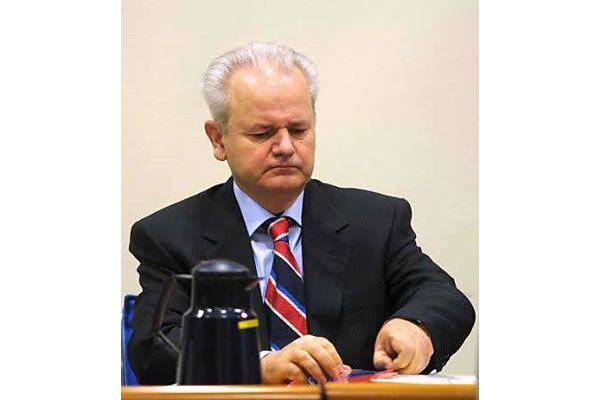Home
WHAT IF MILOSEVIC DOES NOT CONSENT TO A REPLACEMENT FOR JUDGE MAY?
Tribunal has safeguards against possible blocking of the legal process caused by the refusal of an accused to give his consent to the replacement of a judge in an ongoing trial
 Slobodan Milosevic in the courtroom
Slobodan Milosevic in the courtroom What will happen to the trial of Slobodan Milosevic after the resignation of the presiding judge, Richard May, due to health reasons, effective 31 May 2004?
Before Judge May's resignation was officially announced, Belgrade attorney Zdenko Tomanovic expressed his view in a statement given to the New York Times that " if a judge has to leave, then the accused has the right to ask for the proceedings to start all over again."
Tomanovic is and is not right. The accused may withhold his consent to the replacement of a judge, but he cannot block the entire legal process.
According to the Rules of Procedure and Evidence of the Tribunal in The Hague, if one of the judges is unable to continue sitting in a part-heard case, the President of the Tribunal may assign another judge to the case and "order either a rehearing or a continuation of the proceedings from that point", but only "with the consent of the accused".
The accused Goran Jelisic invoked this rule in late 1998, when he withheld his consent to a replacement for Judge Fouad Riad, who had become ill, and the trial was adjourned for nine months while the Egyptian judge was recovering from heart surgery.
The judges probably learned their lesson from that case and they amended the Rules of Procedure and Evidence to prevent possible blocking of ongoing trials because an accused has withheld his consent to the replacement of a judge. The "consent of the accused" remained an important condition for the continuation of a part-heard case, but a procedure was put in place to make it possible for the trial to continue event without this consent if it served the interests of justice.
If the accused refuses to give his consent, the amended Rules stipulate, the remaining two judges may decide that the trial is to continue with a new judge, if taking all circumstances into account, they "determine unanimously that doing so would serve the interests of justice". Both parties – the prosecution and defense – may appeal the decision directly, and the full bench (five judges) of the Appeals Chamber shall rule on the appeal.
If the Appeals Chamber affirms the decision of the Trial Chamber on the continuation of the trial, the President of the Tribunal shall assign a new judge who will be able to join the bench only after he or she has certified that he or she has familiarized himself or herself with the record of the proceedings. In Milosevic's case, this means more than 30,000 pages of transcript and thousands of documents that have been admitted into evidence. The continuation of the trial – with the beginning of the defense case – will thus depend on the time the new judge will require to study all this material.
Except, of course, if judges Robinson and Kwon decide, after Judge May's resignation, to propose to the President of the Tribunal to order a retrial. After two years of hearings and the testimony of 300 witnesses, this option does not seem reasonable or probable. This is undoubtedly what President Meron had in mind when in his statement on the resignation of Judge May he expressed his confidence that the resignation would not have an "unduly disruptive effect" on the proceedings before the Tribunal.
Linked Reports
- Case : Milosevic Slobodan - "Kosovo, Croatia and Bosnia"
- 2004-02-12 VICIOUS CIRCLE OF BLOOD AND REVENGE
- 2004-02-11 SREBRENICA OPERATION WAS COMMANDED BY OFFICERS ON BELGRADE PAYROLL
- 2004-02-10 THE BIGGEST COVER-UP IN UN HISTORY
- 2004-02-25 PROSECUTION WILL NOT CONTINUE WITH ITS CASE AGAINST MILOSEVIC
- 2004-02-25 MILOSEVIC'S DEFENCE CASE SET TO BEGIN ON 8 JUNE
- 2004-03-02 MILOSEVIC AND SELF-DEFENCE
